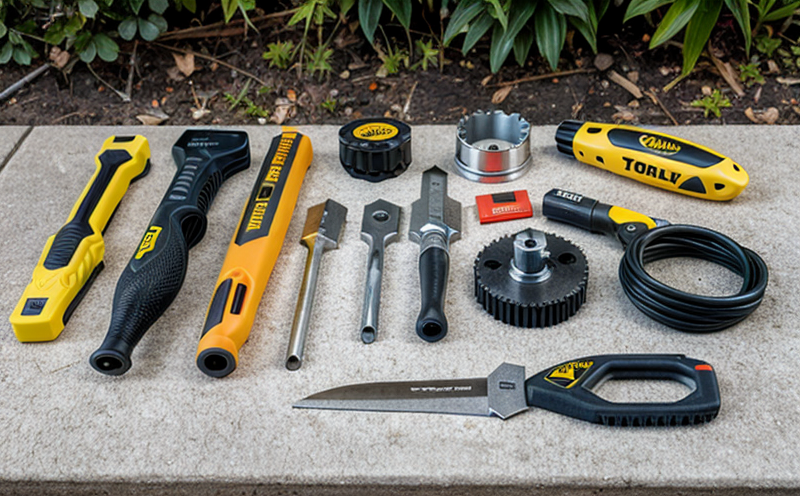Torque Testing of DIY Tools
In today’s fast-paced world, do-it-yourself (DIY) tools have become essential in various sectors ranging from home improvement to small-scale manufacturing. These tools are designed for a wide range of applications and must meet stringent quality standards to ensure user safety and product performance. One critical aspect of this testing is torque testing, which involves measuring the rotational force applied by the tool. This service ensures that DIY tools function within safe and reliable parameters.
Torque testing plays a pivotal role in validating the mechanical integrity and operational limits of DIY tools. It helps manufacturers assess how much force can be safely exerted before the tool reaches its maximum capacity, thus preventing potential accidents or damage to the tool itself. Proper torque testing ensures compliance with relevant international standards such as ISO 8578:2014 for power screwdrivers.
The process of torque testing involves several key steps:
- Identifying the correct type of test specimen
- Setting up the appropriate testing equipment
- Applying calibrated loads to simulate real-world usage conditions
- Maintaining accurate records and reporting findings
The use of torque testers is essential for ensuring product safety, enhancing consumer confidence, and meeting regulatory requirements. By conducting thorough torque tests, manufacturers can identify potential design flaws early in the development process, thereby reducing costs associated with recalls or rework.
Our team at Eurolab uses advanced instrumentation to perform these tests accurately and consistently. Our equipment is capable of measuring torques down to minimal values, ensuring precise results that are crucial for meeting industry standards.
| Test Type | Equipment Used | Calibration Frequency | Data Recording |
|---|---|---|---|
| Torque Testing | Digital Torque Meters, Calibrated Load Cells | Annually or as per manufacturer's recommendation | Automated Data Logging Systems |
By leveraging our expertise in torque testing, we offer a comprehensive service that addresses the specific needs of DIY tool manufacturers. Our approach not only ensures compliance with international standards but also provides valuable insights into product performance and durability.
Industry Applications
- Home Improvement: Testing torque for tools like drills, screwdrivers, and wrenches used in renovation projects.
- Manufacturing: Ensuring torque settings on assembly line equipment meet safety regulations.
- Educational Institutions: Providing students with hands-on experience using calibrated equipment to understand product mechanics.
| Tool Type | Purpose of Testing | Safety Consideration |
|---|---|---|
| Drills | To ensure consistent drilling speeds and prevent overheating. | Avoiding overheating which could lead to tool failure or injury. |
| Screwdrivers | Measuring the torque necessary for optimal screw insertion without stripping screws. | Avoiding stripping screws due to excessive force application. |
Eurolab Advantages
At Eurolab, we offer a range of benefits that make us the preferred choice for torque testing services:
- Expertise and Experience: Our team comprises highly skilled engineers with extensive experience in product safety.
- State-of-the-Art Equipment: We utilize cutting-edge technology to ensure accurate and reliable test results.
- Comprehensive Reporting: Detailed reports are provided, ensuring complete transparency regarding the testing process and outcomes.
- Rapid Turnaround: Our efficient processes allow for quick turnaround times without compromising on quality.
Our commitment to excellence has earned us a reputation as one of the leading laboratories in product safety and quality assurance. We are dedicated to helping our clients meet their testing requirements while ensuring compliance with all relevant international standards.
Quality and Reliability Assurance
- Consistency: Our tests consistently yield repeatable results, providing confidence in the product's performance.
- Rigorous Procedures: We adhere to strict procedures that ensure every test is conducted accurately and precisely.
- Data Integrity: All data collected during testing is stored securely and can be accessed anytime for review or reporting purposes.
Torque testing is just one component of our broader quality assurance framework. By integrating this service into your overall quality management strategy, you can ensure that all aspects of your product development process are being thoroughly evaluated to meet the highest standards.
| Testing Parameter | Acceptance Criteria | Expected Outcome |
|---|---|---|
| Torque Output | Within ±5% of nominal torque setting | Consistent and reliable tool performance under load |
| Safety Margin | No signs of deformation or failure at maximum torque level | Safe operation within the intended use environment |





